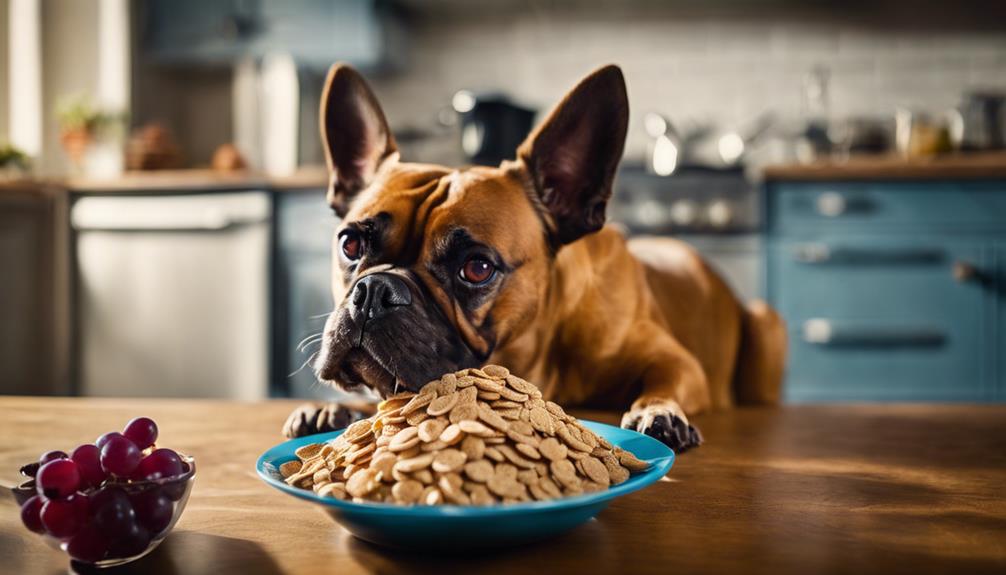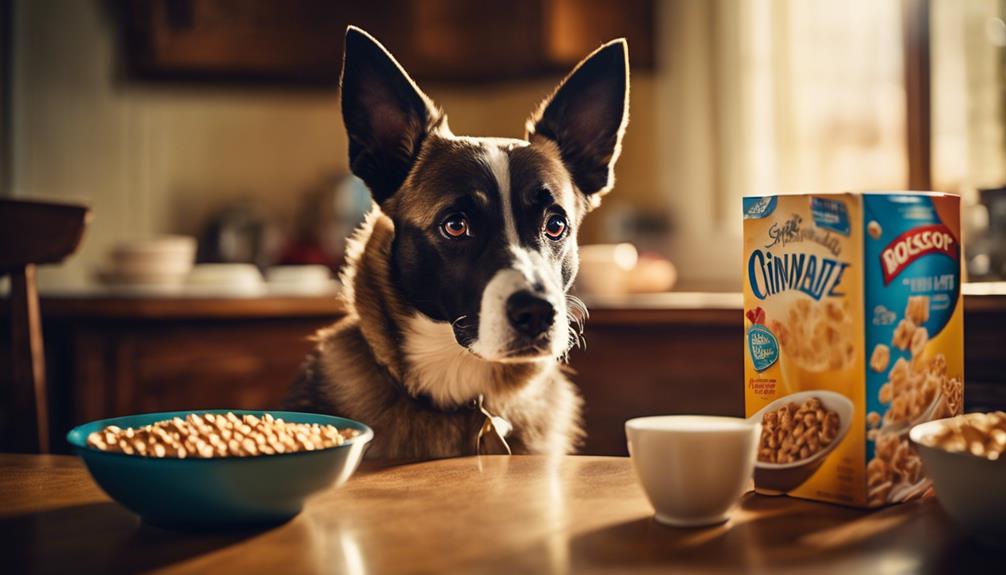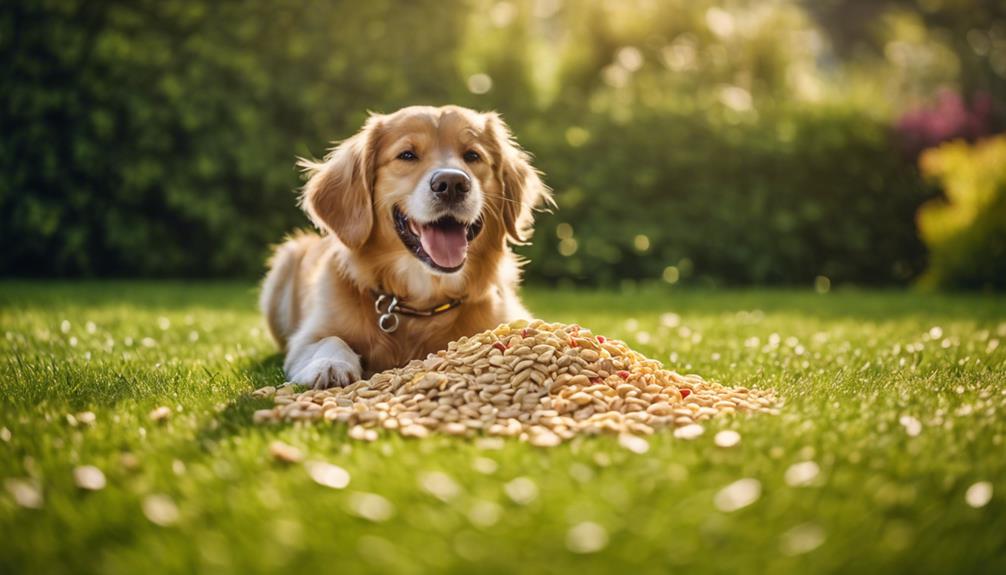Can Dogs Eat Cereal Safely?
Certain cereals can be a good treat for dogs if given correctly. Plain cereals like Cheerios, Bran Flakes, and Rice Krispies are safe options. They’re low in sugar and free from harmful ingredients. Whole grain cereals are also a good choice because they provide a crunchy texture dogs enjoy.
However, it’s crucial to watch how your dog reacts to cereals, as not all dogs digest them well. Avoid any cereal containing chocolate, xylitol, raisins, nuts, or high levels of sugar, as these can be dangerous. It’s also important to give cereal dry, since milk could cause upset in lactose-intolerant dogs.
Cereal should only be a tiny part of what your dog eats. Keeping an eye on how your dog handles cereal is key to making sure it’s a safe treat.
Key Takeaways
- Choose plain, low-sugar cereals like Cheerios for your dog.
- Whole-grain options support digestion and health.
- Serve dry, as milk causes issues for many dogs.
Types of Safe Cereals
Certain cereals like Plain Cheerios, Bran Flakes, and Rice Krispies are considered good for dogs because they have little sugar and no harmful stuff. When you’re thinking about giving your dog cereal as a treat now and then, you should pick ones that don’t have a lot of sugar or bad things like chocolate or raisins. Cereals made from whole grains are a better choice. They’re healthier and dogs love their crunchy texture.
But, keep an eye on how your dog reacts to these cereals. Not every dog handles them well. It’s best to make sure these cereals are just a small part of what your dog eats to keep their diet balanced.
Cereal Ingredients to Avoid

While some cereals can be a nice snack for dogs, being aware of harmful ingredients is essential. Ingredients like chocolate, raisins, or xylitol should never be given to dogs as they can cause serious health problems. Nuts, also common in cereals, might lead to allergies in certain dogs, which can be dangerous. Many cereals contain artificial additives that could negatively affect a dog’s well-being.
High sugar content in cereals can lead to obesity and dental problems in dogs. It’s crucial to pick cereals carefully to avoid these risks. Also, watch out for small ingredients that could cause choking hazards. Checking the cereal’s ingredients thoroughly can help prevent these dangers to your dog.
Cereal and Milk for Dogs

When you introduce milk or dairy products to your dog’s diet, it can cause digestive issues for some canines. This is because many dogs struggle to break down lactose. It’s generally safer to give your dog cereal without any milk to avoid these problems. It’s crucial to choose cereals that are low in sugar to prevent any harm to your pet. Too much sugar can lead to obesity and dental issues in dogs, making sugary cereals a poor choice for their health.
| Aspect | With Milk | Dry (No Milk) |
|---|---|---|
| Digestive Comfort | Less Comfortable | More Comfortable |
| Sugar Content | Could Be Higher | Easier to Manage |
| Lactose Tolerance | Depends on Dog | Not an Issue |
| Nutritional Value | Might Be Low | Varies With Cereal |
Offering cereal as a treat can be a good idea, but it’s important to pick types that are dog-friendly. Always watch how your dog reacts to the cereal, especially paying attention to its fiber content. This approach ensures your dog can enjoy a treat without any unwanted side effects.
Recommended Cereal Portions

Choosing the right portion size for cereal treats for dogs is crucial. You should only give them as a rare snack, not as a regular part of their diet. Pick cereals that are safe and serve them in small bites. Too much cereal can be bad because many contain more sugar and salt than dogs should have, leading to health problems. Treats, including cereal, should make up less than 10% of your dog’s daily calories. Stay away from cereals with more than 10 grams of sugar or 100 milligrams of salt per serving to keep your dog healthy. Always avoid cereals that could be harmful to make sure you’re giving your dog something beneficial.
It’s vital to monitor what we feed our pets to ensure their well-being. Offering the wrong types of cereal can have negative effects on a dog’s health. Therefore, choosing the right treats and keeping an eye on portion sizes is important for maintaining a balanced diet. Remember, the goal is to support your dog’s health with every treat you give.
Health Benefits of Cereal

Not all cereals are good for dogs, but some types can be healthy in small amounts. Whole-grain cereals are great because they have dietary fiber which helps with digestion. Cereals that have added vitamins can also improve a dog’s nutrition. It’s best to pick cereals that are low in fat and calories to avoid weight issues. Since dairy can upset a dog’s stomach, dry cereal is a better choice. When chosen carefully, cereals can be a nutritious snack for dogs, offering benefits like lower blood pressure and better cholesterol levels.
Always check that the cereal doesn’t contain any harmful ingredients for dogs. Integrating the right cereal into a dog’s diet can support their health without leading to weight gain. This is especially important since maintaining a healthy weight is crucial for a dog’s overall well-being.
Frequently Asked Questions
What Kind of Cereal Can Dogs Eat?
- Choose whole grain, low sugar cereals.
- Avoid artificial sweeteners and gluten.
- Practice moderation in serving sizes.
Can Dogs Eat Cereal With Milk?
- Dogs may suffer from lactose intolerance; avoid milk.
- Choose lactose-free alternatives for safer feeding.
- Always monitor portions and assess digestive reactions.
Can My Dog Eat Cheerios Cereal?
- Plain Cheerios are safe for dogs, low in sugar.
- Avoid Honey Nut and sweet varieties for your pet.
- Watch for allergic reactions after feeding them Cheerios.
Can I Give My Dog Bran Flakes?
- Bran flakes add fiber to a dog’s diet.
- Watch for sugar and artificial sweeteners.
- Check for allergic reactions in dogs.

